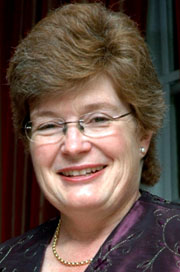 |
| Prof. Helena van Zyl |
|
The School of Management at the University of the Free State (UFS)’s curriculum has been rated in the September 2010 edition of the Financial Mail as the best in South Africa for the second successive year. According to Prof. Helena van Zyl, Director of the School of Management, this rating was done by the school’s MBA students and alumni after the Financial Mail had used an independent company to do a survey about business schools in South Africa.
Apart from its curriculum, from the group of 14 accredited business schools in South Africa, the UFS’s School of Management was also rated by its students and alumni as one of the top three schools in terms of the quality of its lecturers (first position), the degree to which the students enjoyed the course (third position) and the value for money that the school offers (third position).
“This positive rating means that we have clients that are really satisfied with our service, and that is important to us. Our students and alumni feel that we add value, that we empower them, and that we open worlds for them,” said Prof. Van Zyl.
“In this environment where business schools are very competitive, it is an important message to send out that students and alumni are satisfied. It influences prospective MBA students’ choice of a future institution where they would want to study.
“The fact that the UFS’s School of Management has received such a good evaluation, even though we are situated in the centre of South Africa and not in a commercial hub like Johannesburg or Pretoria, is a great privilege for us. Also, if the quality of the programme is taken into account, our MBA programme is very affordable and really offers value for money,” said Prof. Van Zyl.
The School of Management, which is the flagship of the Faculty of Economic and Business Sciences at the UFS, affords this faculty a specific position in corporate South Africa.
Media Release
Issued by: Mangaliso Radebe
Assistant Director: Media Liaison
Tel: 051 401 2828
Cell: 078 460 3320
E-mail: radebemt@ufs.ac.za
17 September 2010